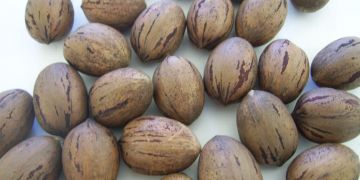Habitat of Pecan Trees
Pecan trees mostly thrive in the south central parts of North America, and they are also common in the states of Illinois, Kentucky, Mississippi, Oklahoma, and Texas.
The pecan tree, like the oak tree, seems to defy the rules of nature. It is a large deciduous tree which produces nuts no larger than the size of an apple. The tree also grows to a maximum height of about 50m, and a maximum spread of roughly 20m.
Pecans are actually drupes not nuts
While we may call the pecan a nut, it is actually a drupe. Drupes are basically fruits with only one pit and they are surrounded by husks. We eat the seeds of the pecan which have a distinct buttery taste.
Health Benefits of Pecans
Recent studies have found out that pecans have the ability to help in boosting your immune system and that they are also good at fighting cancer and heart disease.
Reasons to make pecans part of your diet:
Rich source of proteins
Pecans have a rich source of energy because of their high protein content. They are packed with 9.17g of proteins for every 100g, and they also give you a total energy of 2800kJ per 100g. Besides proteins, pecans also have vitamins, antioxidants and health benefiting nutrients which are essential for the body.
Pecans and blood pressure
While prescription drugs can come in handy when your blood pressure is overly high, most of them have some side effects. Pecans, on the other hand, are nature’s way of lowering blood pressure with absolutely no side effects. Just by eating 4 to 5 servings of pecans in one week can significantly reduce your blood pressure.
Weight control
Contrary to what most of us think about nuts, they actually tend to decrease body fat instead of increasing it. Clinical studies have shown that eating pecans reduces one’s weight. They are thus an excellent choice for those who are restricted to low-carb diets.
Breast cancer
Pecans and olives share one thing in common, and this is oleic acid. Research has shown that oleic acid has the ability to suppress gene activity in cells which are believed to offset breast cancer. Interestingly, a one-ounce serving of pecans has 25% more oleic acid than the amount you would get from a tablespoon serving of olive oil.
Neural system
Besides the nutrients that we’ve looked at so far, pecans are also very rich in minerals such as potassium and zinc which are excellent for your neural system.
Pecans Nutritional information
Here is a list of some of the nutrients that are present in pecans as well as their RDA (Recommended Daily Allowance) percentages.
Principle Nutrient Value (per 100g) %RDA Energy 690 Kcal 34.5% Total Fat 72g 360% Protein 9.17g 17% Vitamin E 24.4mg 163% Thiamine 0.66mg 55% Potassium 410mg 9% Copper 1.2mg 133% Manganese 4.5mg 196%
Culinary use of pecans
Pecans may be consumed raw just like most other nuts. Here are a few other ways to enjoy them:
- The pecan nuts can be sprinkled over desserts to add texture and flavour
- They are used in confectionary, particularly as additions to cakes or biscuits
- They are used to make pecan butter which may be used instead of margarine
- They can be salted or sweetened and then eaten whole
- Pecans make very nice cooking oil as they are rich in good fats





